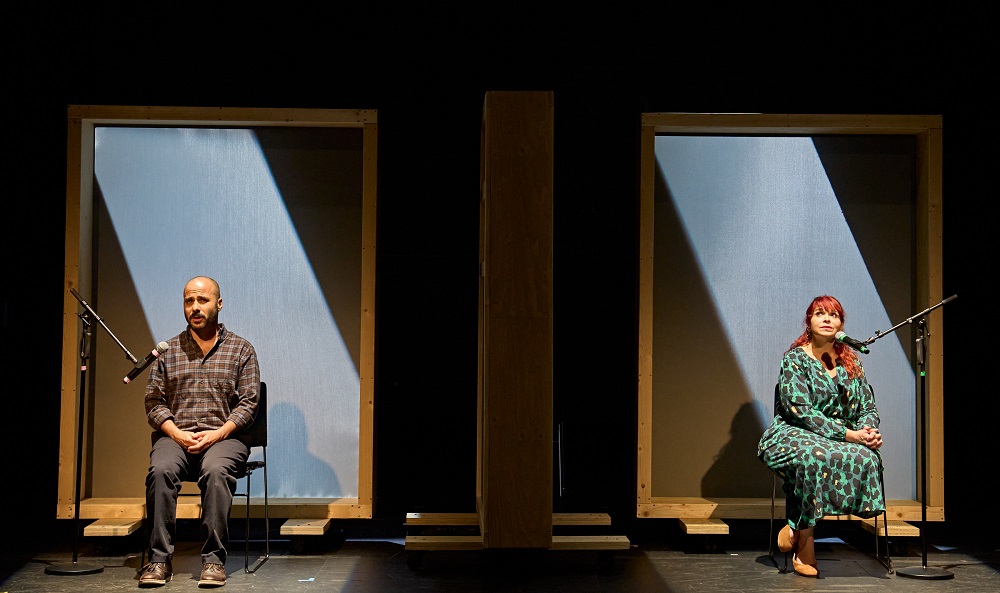
Review: Jews. In Their Own Words.
Review: Jews. In Their Own Words.
An ambitious but muddled play.
It is no mystery to anyone acquainted with London theatre that The Royal Court has quite an experience tackling “the Jewish problem.” And usually, it was not a positive one. In 1987, they almost staged Perdition – a play, modeled after the trial of Rudolf Kastner, a controversial leader of the Budapest Aid and Rescue Committee, that basically accused Israeli leaders – the “zionists” – of collaboration with the Nazis. It was ultimately cancelled a day before the first preview but the phantom of the controversy still haunts the theatre. Over two decades later, The Royal Court welcomed Seven Jewish Children which presented, to put it mildly, a rather one-sided (although beautifully written) view of the Israel-Palestine conflict. And most recently, a manipulative billionaire in the play Rare Earth Mettle received the name of Hershel Fink, despite apparently not being Jewish. Although the name was ultimately changed to Henry Finn and the management explained that they were “unaware” of Hershel Fink being a Jewish name (how?), this was the final straw for the theatre’s financial backers, an international law firm with American Jewish roots Weil, Gotshal & Manges which withdrew its support.
Now, this overly elaborate opening paragraph is necessary to understand where Jews.In Their Own Words came from. It is a form of puzzling atonement that is just as ambitious as it is muddled.
The play’s beginning will be confusing to anyone unfamiliar with Rare Earth Mettle’s controversy. Loinclothed “Hershel Fink” wakes up on stage and a deus ex machina explains to him that he will now find out how did he get his unusually Jewish name – in other words, that the conscious and unconscious antisemitic biases will be thus examined. What follows is taken verbatim from interviews conducted and edited by Jonathan Freedland, with the general concept conceived by Tracy-Ann Oberman.
There are 12 interviewees but only seven actors, so five of them impersonate one high- and one low-profile interviewee – including Oberman, journalist Stephen Bush, Labour MPs Margaret Hodge and Luciana Berger, Man Booker Prize winner Howard Jacobson, Union of Jewish Students ex-president Hannah Rose, as well as decorator Phillip Abrahams, social worker Victoria Hart, Baghdad-born Edwin Shuker, physician Tammy Rothenberg, and Talmudist Joshua Bitensky. Dave Rich, Head of Policy at the Community Security Trust, serves as the narrator. Most dialogues are spoken out with minimal stagecrafts involved – on a bare stage with chairs and screens, most of the time – but there are some attempts to jazz it up a little with graduate-show-like re-enactments of medieval plays and a vaudeville number It Was the Jews That Did It.
The substance of the show is the horrible abuse and discrimination the Jewish people have suffered through centuries. It points out antisemitic threads in the very fabric of English society, from medieval blood libels to Shakespeare and Dickens to Luciana Berger and her dealings with the Labour party under Corbyn (which is thoroughly lambasted). Some material is deeply personal and it is when the show works at its best – such as when Joshua Bitensky describes a vicious attack he was a victim of and his subsequent PTSD, or when Edwin Shuker talks about horrid pogroms in Iraq. At other times, it takes a more general approach, analysing antisemitism through historical, literary and political lenses.
The main problem is, this show lacks theatre. Seven Jewish Children, with all its deeply problematic themes, is quintessentially theatrical – written so sharply it cuts through flesh and blood deep into the soul, it forces you to see things from a different perspective, no matter how flawed. Jews. In Their Own Words does have a few moments that carry the potential to cut just as deep – and yet, the show never delivers. Most of it is more akin to a lecture than to a play, the narrative is crudely divided into themes (now we tackle the topic of the alleged Jewish power, now greed, now Israel… etc). Why hasn’t anyone cut the crucial parts out and woven them into a coherent narrative is anyone’s guess. There is some immense acting talent involved but ultimately what the show attempts is simply too big: it is impossible to cover some 2500+ years of antisemitism *and* include individual confessions *and* add a full-blown modern political critique in a 100-minute show. All are important – but one has to decide. This show doesn’t.
Image: Hemi Yeroham, Debbie Chazen, credit – Manuel Harlan







